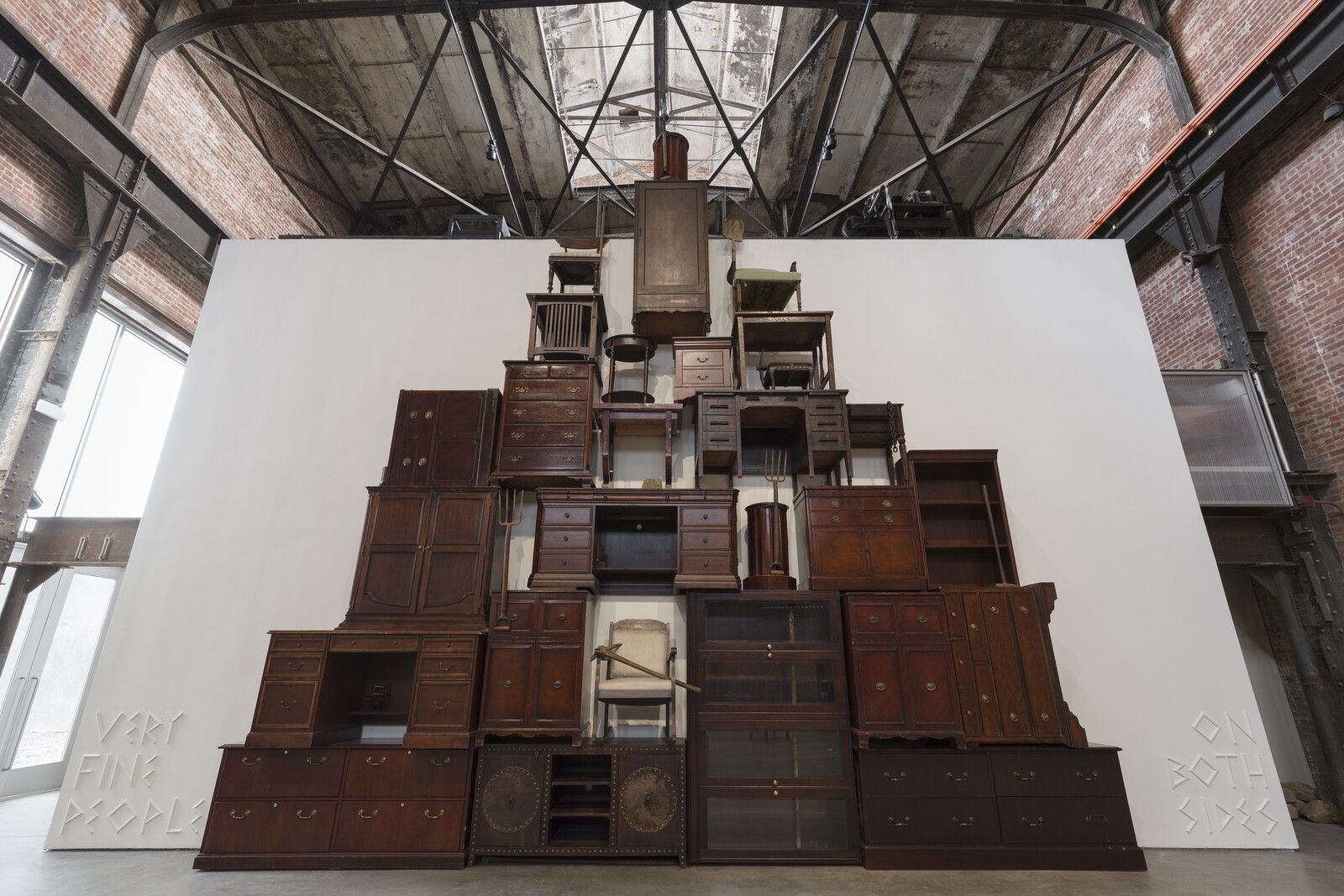Re-Education
September 22, 2022–February 27, 2023
44-19 Purves Street
Long Island City, NY 11101
United States
Hours: Thursday–Monday 12–6pm
T +1 718 361 1750
info@sculpture-center.org
Henrike Naumann’s installations of furniture and design objects ask an enduring question: What is the relationship between design and ideology? Inflected by her own formative years growing up in the former German Democratic Republic (GDR) and then a unified Germany, Naumann’s work often considers the social transformations initiated by Western consumer capitalism as it reached former socialist states. Her installations are case studies in lingering cultural moments, unresolved kitchen table politics, and design’s capacity to reconcile or reignite the past.
Naumann’s exhibition at SculptureCenter references two phenomena: first, the deployment of Allied anti-fascist “re-education” programs to reestablish a footing for democracy in West Germany after World War II; and second, the later, implicit, self-“re-education” after 1989 of those living in former socialist states, like Naumann’s native East Germany. For Naumann’s post-1989 generation, “re-education” happened through an imported, American pop culture (Naumann cites The Flintstones as a touchstone) and increased consumer agency—in essence, the GDR entering Western history through retail and media.
Looking at the United States as an interested outsider, Naumann’s work uses found and purchased furnishings that reflect an enduring “rustic” or “rural” sensibility in American interior design. Here, Naumann constructs a building-scaled display of chairs organized in a critical parody of the dubious “horseshoe theory,” a model developed in Germany in the 1930s and revived in the 1990s to define the political center and to treat far left and far right extremisms as equal threats to its order, as if they were the two ends of a horseshoe bending toward each other. Well-suited for an age that is both hyper-aware of political identifications and wary of misreading aesthetic cues, Naumann’s work uses furnishings that reflect received ideas about nature, prehistory, industry, and democracy to encourage a conspiratorial questioning about the deeper meanings of the objects of our daily lives: is there such a thing as a libertarian stool, a communist bench, or a neconservative armchair? The exhibition also includes a survey of Naumann’s video works since 2012 that further explore themes of youth culture and radicalization, archaeology and modern political identity, and state power relations as expressed through consumerism. Naumann’s project opens a new consciousness of how we live among the ruins of twentieth century ideologies that were exported and reimported by the US over the last several decades—now especially visible to a generation born just as the Cold War drew to a close.
Henrike Naumann’s (born 1984 in Zwickau, former German Democratic Republic; lives and works in Berlin) work reflects socio-political problems on the level of interior design and domestic space and explores antagonistic political beliefs through the ambivalent aesthetics of personal taste. In her immersive installations she arranges furniture and home decor into scenographic spaces interspersed with video and sound work.
Henrike Naumann: Re-Education is curated by Kyle Dancewicz, Deputy Director, SculptureCenter, with Christopher Aque, Exhibition & Program Manager. Project Curatorial Assistant: Leo Cocar.
Support
Supported by LEAP.
Additional support for Henrike Naumann: Re-Education is provided by the Institut für Auslandsbeziehungen e.V. and Goethe-Institut New York
Leadership support of SculptureCenter’s exhibitions and programs is provided by Carol Bove, Lee Elliott and Robert K. Elliott, Richard Chang, Jill and Peter Kraus, the Anna-Maria and Stephen Kellen Foundation, Barbara and Andrew Gundlach, Jacques Louis Vidal, Miyoung Lee and Neil Simpkins, Eleanor Heyman Propp, Libby and Adrian Ellis, Candy and Michael Barasch, Sanford Biggers, Jane Hait and Justin Beal, and Amy and Sean Lyons.


